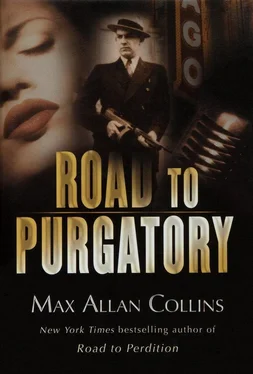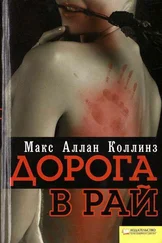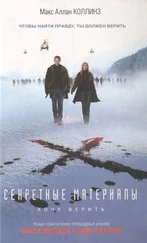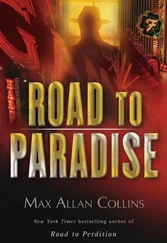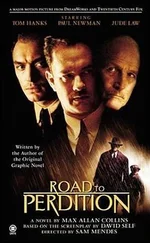Michael said nothing.
Drury said, “It’s your best option, kid. What if we leaked the truth? That you went into Nitti’s organization, undercover, for Eliot Ness? How long would they let you live?”
Michael said nothing.
Ness looked at Drury and shook his head. Drury, lowering his gaze, sighed heavily. The G-man got up slowly, took one last mournful lingering look at Michael, and went out. Drury, his expression disgusted, was halfway out the door when Michael finally spoke.
“Interesting interrogation technique,” Michael said.
Drury, startled, said nothing.
“Don’t hit the suspect with a rubber hose,” Michael said. “Hit him with everything you know, and see if it breaks him down... Do I get my phone call now?”
Still poised in the doorway, Drury sighed. “You don’t need it. A lawyer’s already been around. Should be here with your writ of habeas corpus any time now.”
“Your friend Ness looks like he’s been drinking.”
Drury stepped back in; shut the door. His tone shifted to conversational. “He’s had a tough go of it lately. Washington thought he was spending too much time in Chicago; been running him ragged all ’round the country. Only reason he’s back in town now is some joint workshop with the FBI.”
“America’s most famous Prohibition agent... a drunk?”
“Eliot’s no drunk. He’s still a good man... and he’s concerned about you. You should let him be your friend. You should let me be your friend.”
It sounded genuine enough, but Michael knew what both men wanted was to use him.
“I’ll think about it,” Michael said.
“All I ask,” Drury said.
Then the cop slipped out, and a uniformed cop ushered Michael back to the cell.
Less than an hour later, Michael was on the street, in his military-style gabardine trenchcoat over the brown sportcoat and tan slacks — same as for his dates yesterday with Patsy Ann and Estelle. The .45, returned to him by the police, was back in its shoulder sling; he was, after all, licensed to carry a concealed weapon.
He found the Ford sedan where he’d left it, parked by the hydrant, wiper wearing three parking tickets; at least it hadn’t been towed. He was about to get in when a car behind him honked.
Glancing back, he saw Louie Campagna at the wheel of a dark blue ’41 Chevy. The lumpy-faced little hood curled a finger.
Michael got in on the passenger side, shut himself in, and wondered if this was a one-way ride. He said, “Did you arrange for that mouthpiece, Louie? Thanks.”
“Actually, I didn’t. Guy that sprung you was Bulger.”
Michael frowned. “Joe Bulger? He’s Ricca’s attorney!”
“I know. Things are... upside down. I’ll fill you in.”
The heater was on in the car, and the stocky gangster was not in his topcoat, nor was he wearing a hat, exposing his thinning black hair. He looked awful, pasty white and baggy-eyed — not as bad as Ness and Nitti; but bad enough.
“Sorry about the Carey dame,” Campagna said, but his mind was obviously elsewhere.
“Yeah. Thanks.”
“We need to talk. Diner down the street.”
Within minutes they were in a booth and, as they waited for coffee, Campagna asked, “You hear about the indictments?”
“You were expecting it, right?”
Campagna nodded. “But it’s like death, kid — you can’t get ready for shit like this, even when you know it’s comin’... Something bad happened last night. At Frank’s. Counsel meeting.”
Michael leaned forward in the booth. “Tell me they didn’t vote to have Estelle killed.”
“No! No. Hell no. I figure that was Ricca.”
“Not Mr. Nitti.”
Campagna smirked mirthlessly. “Does it sound like him?”
Michael had already thought this through; he knew a murder of this kind was against everything Nitti believed in, where public opinion was concerned.
Still, he said, “Lot of pressure on him lately, Louie. Ricca breathing down his neck. These indictments.”
Campagna shrugged, as if they were discussing baseball scores of not very important games. “Word I get is it was a couple, a man and wife, old friends of hers. Named Borgia.”
Michael raised an eyebrow. “As in Cesare and Lucretia?”
“No, I think their names are John and Olivia. John’s a small-timer, on the fringes of the Outfit, worked with Nicky Dean at the 101 Club. Olivia was a 26 girl, there.”
“Is this solid, them doing it?”
“No. Just talk. But John’s got ties to Ricca.” Another shrug; Campagna seemed vaguely annoyed to be talking about such a trivial matter.
A waitress brought coffee and, after a sip, Michael asked Campagna, “You still up for a little preventative medicine, where the Waiter is concerned?”
Campagna sighed. Shook his head glumly. “I think we missed our moment.”
“Why do you say that?”
“I said somethin’ bad happened last night.”
Campagna described the counsel meeting in the living room of Nitti’s Riverside home.
Ricca took over the meeting, out of the gate. He reminded Nitti and the others that hiring squealers Bioff and Browne had been Nitti’s idea; that Nicky Dean was also Nitti’s man. That Nitti had “masterminded the whole scam and it went sour.”
“No point in all of us goin’ down this road,” Ricca had said. “Al took the fall for the rest of us and went on trial alone. You can do the same, Frank — you plead guilty and we’ll take care of things. Till you get out.”
“I’ve told you, Paul,” Nitti said wearily. “It’s conspiracy. Nobody can take the fall for the rest of us — we gotta stick together, and try and beat the thing.”
Sipping his coffee, Campagna told Michael, “It got heated, then — harsh words, back and forth. Thought it might come to blows... or worse. Finally Ricca says, ‘Frank, you’re askin’ for it.’ ”
Michael frowned. “What did Mr. Nitti say?”
“Nothing. He... Mike, I ain’t proud of this... Frank looked around the room at us and...” Campagna had tears in his eyes. “...we all looked away. Nobody stood up for him.”
“Not even you, Louie?”
“No. Mike, there was one strong man in that room. One leader. And it sure as hell wasn’t me. But it also wasn’t Frank.”
“What did Mr. Nitti do?”
“That was the worst of it. He got up, went to the front door, opened it, and pointed to the outside.”
“What was so bad about that?”
“Ain’t you Sicilian, kid?”
Without missing a beat, Michael said, “Sure I’m Sicilian... a Sicilian raised in DeKalb, Illinois. What was so bad about what Mr. Nitti did?”
“In the old country, when you open the door on your guests, indicating you want ’em to leave... it’s a breach.”
“Breach.”
“Of Sicilian peasant rules of hospitality. It’s like Frank spit in all our faces.”
“But mostly,” Michael said, “he was answering Ricca.”
“When Ricca said Frank was gonna get it, you mean? Yeah. Yeah, that was the main meaning.”
“How did Ricca react?”
Campagna gestured elaborately with both hands. “It was so... so goddamn dramatic , that we all just got up, got our hats and coats and went out into the cold. Without a word from Frank. Without a word from us.”
“So, Louie. Where do you stand?”
“I wish I knew, kid. Do you know?”
Michael said nothing. Then he took the check, and paid at the register. Campagna tagged along.
“Kid — where do you stand?”
“Take me to my car, Louie. Would you?”
Campagna sighed. “Sure. Sure, Mike. Right away.”
Like Frank Nitti, Paul Ricca had moved to a suburb, River Forest; but the Waiter’s heart, Michael knew, remained on the Near West Side where many workers in various legit and not-so-legit Outfit enterprises made their homes. Sluggers, drivers, and (yes) waiters lived in these well-maintained two- and three-story tenements, in a neighborhood of cast-iron porches, broad sidewalks, and no lawns. Here, in this longtime breeding ground for Outfit soldiers, Ricca could court the Young Turks coming up.
Читать дальше
